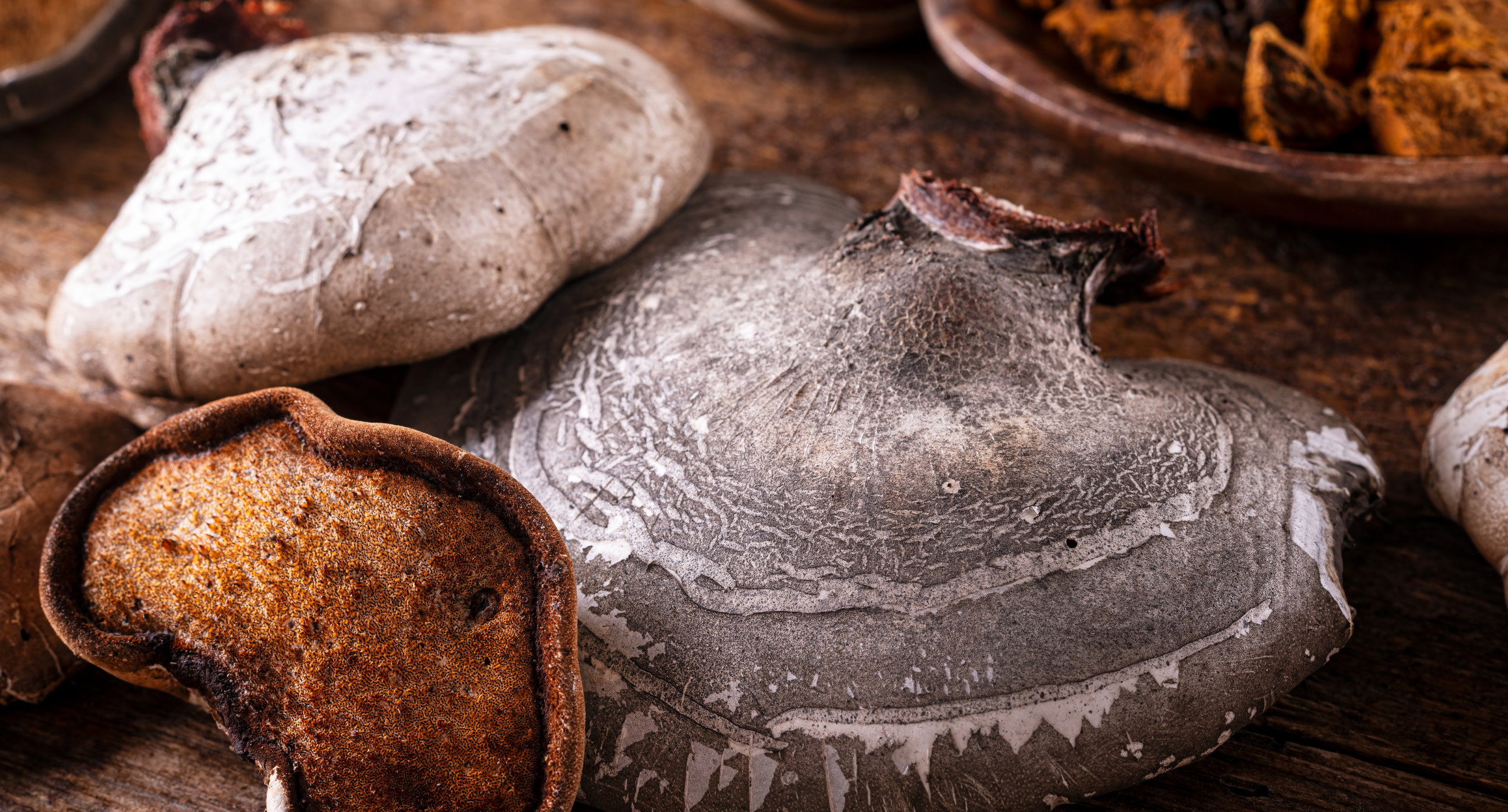
Chaga Mushroom
Scientific Name: Inonotus obliquus
Herbal Profile of Chaga Mushroom (Inonotus obliquus)
Common Name: Chaga Mushroom, Birch Mushroom
Botanical Name: Inonotus obliquus
Family: Hymenochaetaceae
Description:
Chaga is a parasitic fungus that primarily grows on birch trees in cold climates, such as Northern Europe, Russia, Canada, and parts of the United States. The fungus appears as a black, crusty growth on the outside of the tree but has a rich orange interior. Chaga has been used for centuries in traditional medicine, especially in Siberian and Russian folk remedies, for its powerful immune-boosting, antioxidant, and anti-inflammatory properties.
Key Constituents:
- Betulinic acid: Derived from the birch tree, it has anti-cancer and anti-inflammatory properties.
- Polysaccharides (Beta-glucans): Immune-modulating and support the body’s defense mechanisms.
- Triterpenoids: Contribute to anti-inflammatory and antioxidant effects.
- Melanin: A pigment that has antioxidant properties and protects against UV damage.
- Phytosterols (Lanosterol, Inotodiol): Contribute to cholesterol-lowering and immune-enhancing properties.
- Antioxidants: Chaga is one of the richest sources of antioxidants, particularly superoxide dismutase (SOD).
Medicinal Uses:
- Immune System Support:
- Antioxidant and Anti-aging:
- Anti-inflammatory and Pain Relief:
- Cancer Prevention and Treatment Support:
- Liver Detoxification and Support:
- Blood Sugar Regulation:
- Digestive Health:
- Cardiovascular Health:
Forms of Use:
- Tea or Decoction: Chaga is traditionally consumed as a tea or decoction. The chunks of the mushroom are simmered in water for several hours to extract its beneficial compounds. This form is popular for boosting immunity, detoxifying the liver, and overall wellness.
- Tinctures: Alcohol-based Chaga tinctures are used for more concentrated medicinal effects, particularly for immune system support and antioxidant protection.
- Powder: Chaga powder is made by grinding the mushroom and can be added to smoothies, coffee, or used in cooking for a nutritional boost.
- Capsules: Standardized doses of Chaga are available in capsule form, making it convenient for daily supplementation.
- Topical Applications: Chaga can be used topically in creams or balms to promote skin health and reduce inflammation.
Precautions:
- Autoimmune Conditions: Chaga stimulates the immune system, so individuals with autoimmune conditions should use it cautiously, as it may worsen symptoms by overactivating the immune response.
- Blood Thinners: Chaga may have blood-thinning properties and could enhance the effects of anticoagulant medications. People taking blood thinners should consult their healthcare provider before using Chaga.
- Pregnancy and Breastfeeding: While Chaga is generally considered safe, its use during pregnancy and breastfeeding should be approached with caution, and professional advice is recommended.
- Hypoglycemia: Chaga may lower blood sugar levels, so individuals with diabetes or those taking medications to lower blood sugar should monitor their levels closely.
Growing and Harvesting:
- Climate: Chaga grows best in cold climates and is found on birch trees in forests across northern regions of Europe, Asia, and North America.
- Harvesting: Chaga is harvested from living birch trees, typically during the colder months when the tree is dormant. The fungus is carefully cut from the tree without damaging the host tree. It is then dried and prepared for medicinal use.
- Sustainability: Harvesting Chaga should be done responsibly to ensure the health of the birch trees and the sustainability of Chaga populations in the wild.
Traditional and Historical Uses:
- Russian and Siberian Folk Medicine: Chaga has been used for centuries in Russian and Siberian folk medicine for its healing properties. It was traditionally used as a remedy for gastrointestinal problems, cancer, and infections, and as a general health tonic.
- Traditional Chinese Medicine (TCM): In TCM, Chaga is valued for its ability to boost "jing" or life force, support immunity, and promote longevity.
- Inuit Medicine: Indigenous peoples of the Arctic and boreal forests, including the Inuit, have used Chaga for treating respiratory conditions, digestive issues, and infections.
Chaga mushroom is a powerful adaptogen and immune booster with extensive uses in traditional medicine for supporting overall health, promoting longevity, and treating various inflammatory and degenerative conditions. Its high antioxidant content makes it a valuable tool for protecting the body against oxidative stress and disease. When used appropriately, Chaga offers a wide range of health benefits with minimal side effects.
